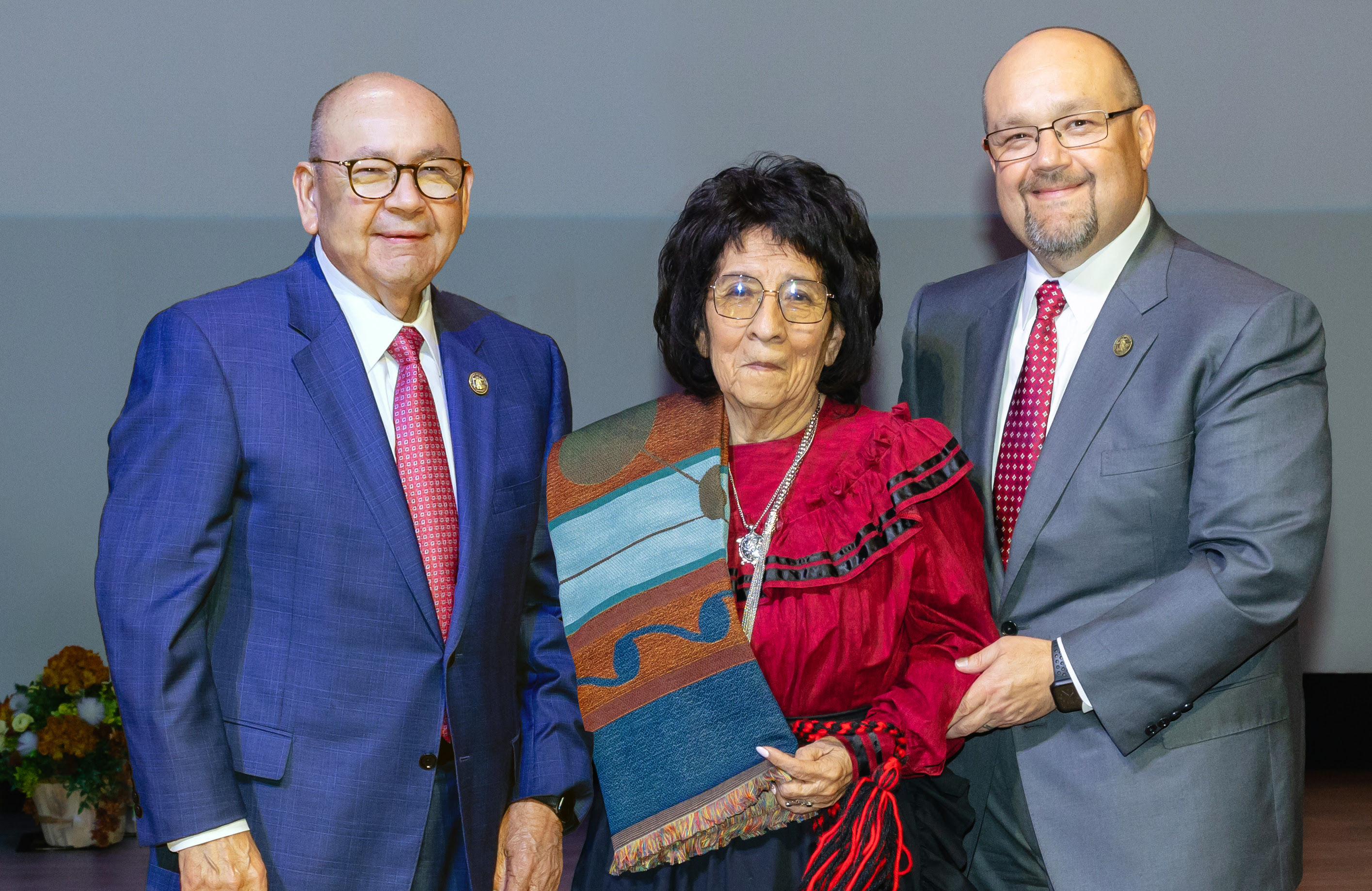
- Details
- By Chickasaw Nation Media
SULPHUR, Okla. – Chickasaw Nation Governor Bill Anoatubby said the tribe’s cultural evening, hosted Oct. 3 at the Chickasaw Cultural Center as part of the Chickasaw Annual Meeting and Festival, demonstrated an inherent cultural unity shared by all Chickasaws.
“This is a very special time of year,” Governor Anoatubby said to a packed audience in the Chickasaw Cultural Center’s Anoli’ Theater. “The cultural evening, in association with the Chickasaw Annual Meeting and Festival, all seem to fit together as we come together to celebrate our heritage, one that we share with each other.”
“We get to enjoy and celebrate our cultural traditions as well and get to reflect on this ongoing story of determination and continued progress,” he said.
Governor Anoatubby said the week’s activities give all tribal citizens the opportunity to draw inspiration from those who have dedicated themselves to ensuring the vitality of Chickasaw cultural traditions.
“It’s a time for us to show how united we are. We get to enjoy the collective spirit of our people. We strengthen each other by getting together. We have these bonds that are inherent in us,” he said.
Governor Anoatubby said the cultural evening offered an opportunity to recognize individuals for their commitment to ensuring Chickasaw traditions are not just alive but passed on to the next generation of Chickasaws.
The night’s festivities were punctuated with the presentation of the 2024 Silver Feather Award.
The Silver Feather Award was created in 1999 and is bestowed on selected Chickasaw elders who dedicate themselves to the preservation and revitalization of Chickasaw language, culture and lifeways.
“Each recipient is a Chickasaw treasure held in the highest regard by the Chickasaw Nation,” Governor Anoatubby said. “It is certainly my pleasure to announce this evening’s Silver Feather Award winner is Miss JoAnn Ellis.”
Governor Anoatubby said Ellis is an elder who has been instrumental in preserving the tribe’s rich history, arts, literature, language and culture.
“The award is significant in that the feather is one of the most honored gifts a First American can receive. Silver, because of its endurance and captivating shine always caught the eye of our Chickasaw Ancestors over 500 years ago,” Governor Anoatubby said. “We honor JoAnn for her lifetime of service to the Chickasaw language and her lifetime commitment to the Chickasaw language learners. Joann was raised in a home where both parents were fluent in Chickasaw.”
Ellis’s career with the Chickasaw Nation began in August 1995. She served the Chickasaw Nation as a language teacher within the Cultural Resources Department and later joined the Chickasaw Nation Language Revitalization Program as a Chickasaw language specialist.
Governor Anoatubby said Ellis was a master speaker in the Chickasaw Nation’s first Master Apprentice Program, mentoring numerous students in their efforts to become speakers of the Chickasaw language.
Ellis has been a member of the Chickasaw Language Committee since its inception and is an adjunct professor teaching the Chickasaw language at East Central University.
Governor Anoatubby said Ellis is a coauthor with Vicki Penner on two Chickasaw cookbooks published by Chickasaw Press: “Ilimpa’chi’: We’re Gonna Eat!” and “Ilittibaaimpa’: Let’s Eat Together.”
Ellis was a translator on Glenda Galvan’s Chikasha Stories Series and contributed to The Chickasaw Prayer Book, coauthored by the Chickasaw Language Committee and published by Chickasaw Press.
“JoAnn remains an active member of the Chickasaw Language Committee and continues to contribute to preserving and revitalizing the Chickasaw language for our descendants,” Governor Anoatubby said.
Awards were also presented to winners of the Southeastern Art Show and Market (SEASAM) during cultural evening.
SEASAM winners include:
Adult
Best of Show – Regina Free – “Osi”
Best of Culture – Tammy Stick – “Ancient Ancestor”
Best of 3D – Troy Jackson – “Battle For A Nation”
Best of 2D – Keegan Bellefeuille – “Anukfokachi”
Youth
Best of Show – Anita Mitchell – “The Journey Home”
Best of Culture – Kay Gurry – “The Storyteller”
Best of 3D – Nichole Cavener – “As the Conch Shell Sings”
Best of 2D – Natalie Lawson – “Loksi”
More Stories Like This
NCAI Passes Two Emergency Resolutions on Immigration Enforcement ActivitiesChickasaw Lighthorse Police Officer named Indian Country Law Enforcement Officer of the Year
Indian Gaming Association Rallies Broad Coalition Against Sports Event Contracts It Calls Illegal Threat to Tribal Sovereignty
Navajo Resources and Development Committee Issues Notice on Livestock Inspection Requirements
American Prairie, Tribal Coalition Files Protest Over Rescinded Grazing Rights
Help us defend tribal sovereignty.
At Native News Online, our mission is rooted in telling the stories that strengthen sovereignty and uplift Indigenous voices — not just at year’s end, but every single day.
Because of your generosity last year, we were able to keep our reporters on the ground in tribal communities, at national gatherings and in the halls of Congress — covering the issues that matter most to Indian Country: sovereignty, culture, education, health and economic opportunity.
That support sustained us through a tough year in 2025. Now, as we look to the year ahead, we need your help right now to ensure warrior journalism remains strong — reporting that defends tribal sovereignty, amplifies Native truth, and holds power accountable.
 The stakes couldn't be higher. Your support keeps Native voices heard, Native stories told and Native sovereignty defended.
The stakes couldn't be higher. Your support keeps Native voices heard, Native stories told and Native sovereignty defended.
Stand with Warrior Journalism today.
Levi Rickert (Potawatomi), Editor & Publisher

